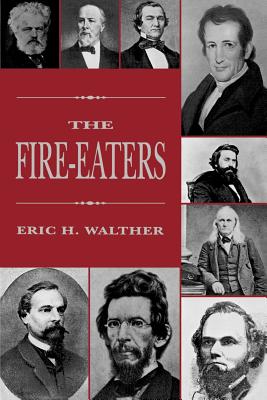The Fire-Eaters

The Fire-Eaters
In the early 1850s, northerners and southerners alike used the term fire-eater to describe anyone whose views were clearly outside the political mainstream. Eventually, though, the word came to be most closely identified with those southerners who were staunch and unyielding advocates of secession. In this broadly researched and illuminating study, Eric H. Walther examines the lives of nine of the most prominent fire-eaters: Nathaniel Beverly Tucker, William Lowndes Yancey, John Anthony Quitman, Robert Barnwell Rhett, Laurence M. Keitt, Louis T. Wigfall, James D.B. De Bow, Edmund Ruffin, and William Porcher Miles.
Walther paints skillful portraits of his subjects, analyzing their backgrounds, personalities, and contributions to the movement for disunion. Although they shared the common goal of southern independence, Walther shows that in many respects the fire-eaters differed markedly from one another. It was their very diversity, he maintains, that enabled them to appeal to such a wide spectrum of southern opinion and thereby rally support for secession. In his exploration of the role of the fire-eaters in the secession movement, Walther touches upon a number of perennial themes in southern history, including the appeal of proslavery thought and southern expansionism, the place of education and industrialization in antebellum southern society, the significance of oratory in southern culture, and the nature of southern nationalism. He also describes the fire-eaters' activities on behalf of the Confederacy and traces the course of their lives after the war. The Fire-Eaters makes a valuable contribution to our understanding of the secession movement and the context in which it developed. There is no other study available that treats these men as a group and that delineates their manifold differences as well as their similarities. Walther shows that secessionism was not a monolithic ideology but rather a movement that emerged from many sources, spoke in many voices, and responded to a number of regional problems, needs, and aspirations.PRP: 288.00 Lei
Acesta este Prețul Recomandat de Producător. Prețul de vânzare al produsului este afișat mai jos.
259.20Lei
259.20Lei
288.00 LeiLivrare in 2-4 saptamani
Descrierea produsului
In the early 1850s, northerners and southerners alike used the term fire-eater to describe anyone whose views were clearly outside the political mainstream. Eventually, though, the word came to be most closely identified with those southerners who were staunch and unyielding advocates of secession. In this broadly researched and illuminating study, Eric H. Walther examines the lives of nine of the most prominent fire-eaters: Nathaniel Beverly Tucker, William Lowndes Yancey, John Anthony Quitman, Robert Barnwell Rhett, Laurence M. Keitt, Louis T. Wigfall, James D.B. De Bow, Edmund Ruffin, and William Porcher Miles.
Walther paints skillful portraits of his subjects, analyzing their backgrounds, personalities, and contributions to the movement for disunion. Although they shared the common goal of southern independence, Walther shows that in many respects the fire-eaters differed markedly from one another. It was their very diversity, he maintains, that enabled them to appeal to such a wide spectrum of southern opinion and thereby rally support for secession. In his exploration of the role of the fire-eaters in the secession movement, Walther touches upon a number of perennial themes in southern history, including the appeal of proslavery thought and southern expansionism, the place of education and industrialization in antebellum southern society, the significance of oratory in southern culture, and the nature of southern nationalism. He also describes the fire-eaters' activities on behalf of the Confederacy and traces the course of their lives after the war. The Fire-Eaters makes a valuable contribution to our understanding of the secession movement and the context in which it developed. There is no other study available that treats these men as a group and that delineates their manifold differences as well as their similarities. Walther shows that secessionism was not a monolithic ideology but rather a movement that emerged from many sources, spoke in many voices, and responded to a number of regional problems, needs, and aspirations.Detaliile produsului













